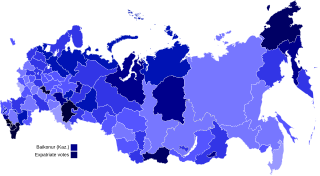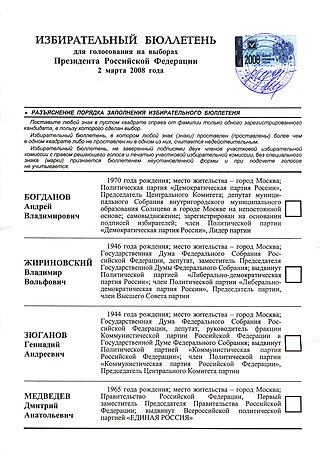
On the federal level, Russia elects a president as head of state and a parliament, one of the two chambers of the Federal Assembly. The president is elected for, at most, two consecutive six-year terms by the people. The Federal Assembly has two chambers. The State Duma has 450 members, elected for five-year terms. The Federation Council is not directly elected; each of the 89 federal subjects of Russia sends 2 delegates to the Federal Council, for a total of 208 (178 + 30, members.

Presidential elections were held in Russia on 14 March 2004. Incumbent President Vladimir Putin was seeking a second full four-year term. It was a landslide victory for Putin, who was re-elected with 72% of the vote.

Gennady Andreyevich Zyuganov is a Russian politician who has been the General Secretary of the Communist Party of the Russian Federation and served as Member of the State Duma since 1993. He is also the Chair of the Union of Communist Parties – Communist Party of the Soviet Union (UCP-CPSU) since 2001. Zyuganov ran for President of Russia four times, most controversially in 1996, when he lost in the second round to Boris Yeltsin.

Presidential elections were held in Russia on 26 March 2000. Incumbent prime minister and acting president Vladimir Putin, who had succeeded Boris Yeltsin after his resignation on 31 December 1999, sought a four-year term in his own right and won in the first round.

Presidential elections were held in Russia on 16 June 1996, with a second round being held on 3 July 1996. It resulted in a victory for the incumbent Russian president Boris Yeltsin, who ran as an independent politician. Yeltsin defeated the Communist Party of the Russian Federation challenger Gennady Zyuganov in the second round, receiving 54.4% of the vote. Yeltsin's second inauguration ceremony took place on 9 August 1996.

Presidential elections were held in Ukraine on 31 October, 21 November and 26 December 2004. This was the fourth presidential election in Ukraine following independence from the Soviet Union. The last stages of the election were contested between the opposition leader Viktor Yushchenko and incumbent Prime Minister Viktor Yanukovych from the Party of Regions. It was later determined by the Ukrainian Supreme Court that the election was plagued by widespread falsification of the results in favour of Yanukovych.

Presidential elections were held in Russia on 2 March 2008, and resulted in the election of Dmitry Medvedev as the third President of Russia. Medvedev was elected for a four-year term, whose candidacy was supported by incumbent president Vladimir Putin and five political parties, received 71% of the vote, and defeated Gennady Zyuganov of the Communist Party of the Russian Federation, and Vladimir Zhirinovsky of the Liberal Democratic Party of Russia.

Legislative elections were held in Russia on 2 December 2007. At stake were the 450 seats in the 5th State Duma, the lower house of the Federal Assembly. Eleven parties were included in the ballot, including Russia's largest party, United Russia, which was supported by President of Russia Vladimir Putin. Official results showed that United Russia won 64.3% of the votes, the Communist Party of the Russian Federation 11.6%, the Liberal Democratic Party of Russia 8.1%, and Fair Russia won 7.7%, and none of the other parties won enough votes to gain any seats.

Presidential elections were held in Ukraine on 17 January 2010. As no candidate received a majority of the vote, a run-off election was held between Prime Minister Yulia Tymoshenko and opposition leader Viktor Yanukovych on 7 February.

People's Freedom Party "For Russia without Lawlessness and Corruption" was a liberal-democratic political party in Russia founded on 13 December 2010 by opposition politicians Vladimir Ryzhkov, Boris Nemtsov, Mikhail Kasyanov and Vladimir Milov and de facto dissolved on 16 June 2012. The name is a reference to the original liberal-democratic Party of Popular Freedom.

Legislative elections were held in Russia on 4 December 2011. At stake were the 450 seats in the 6th State Duma, the lower house of the Federal Assembly. United Russia won the elections with 49.32% of the vote, taking 238 seats or 52.88% of the Duma seats.

Presidential elections were held in Russia on 4 March 2012. There were five officially registered candidates: four representatives of registered parties, and one nominal independent. The election was the first one held after constitutional amendments were introduced in 2008, in which the elected president for the first time would serve a six-year term, rather than a four-year term.

Presidential elections were held in Azerbaijan on 9 October 2013. The result was a victory for incumbent President Ilham Aliyev, who received a reported 85% of the vote, whilst leading opposition candidate Jamil Hasanli finished second with a reported 6% of the vote.

Presidential elections were held in Russia on 18 March 2018. Incumbent president Vladimir Putin was eligible to run. He declared his intent to do so on 6 December 2017 and was expected to win. This came following several months of speculation throughout the second half of 2017 as Putin made evasive comments, including that he had still not decided whether he would like to "step down" from the post of president, that he would "think about running", and that he "hadn't yet decided whether to run for another term". Different sources predicted that he would run as an independent to capitalize more support from the population, and although he could also have been nominated by the United Russia party as in 2012, Putin chose to run as an independent. Among registered voters in Russia, 67.5% voted in the election.

Legislative elections were held in Russia from 17 to 19 September 2021. At stake were 450 seats in the 8th convocation of the State Duma, the lower house of the Federal Assembly. Going into the elections, United Russia was the ruling party after winning the 2016 elections with 343 of the 450 seats, and retaining a supermajority. In March 2020, it was proposed to hold a snap election in September 2020 due to proposed constitutional reforms, but this idea was abandoned. On 18 June 2021, Vladimir Putin signed a decree calling the election for 19 September the same year. Owing to the COVID-19 pandemic in Russia, voting in the election lasted for three days, from 17 to 19 September. Final turnout was reported to be 51.72%.

Presidential elections were held in Russia from 15 to 17 March 2024. It was the eighth presidential election in the country. The incumbent president Vladimir Putin won with 88% of the vote, the highest percentage in a presidential election in post-Soviet Russia, gaining a fifth term in what was widely viewed as a foregone conclusion. He was inaugurated on 7 May 2024.

The 2000 presidential campaign of Vladimir Putin, Prime Minister of Russia, was announced on 13 January 2000, during his trip to Saint Petersburg.

This article contains the list of candidates associated with the 2008 Russian presidential election.
The Gennady Zyuganov presidential campaign, 2008 was the presidential campaign of Gennady Zyuganov in the 2008 election. This was the third presidential campaign of Zyuganov, who had been a candidate in both the 1996 and 2000 elections.

A constitutional referendum was held in Russia between 25 June and 1 July 2020. President Vladimir Putin proposed the referendum during his address to the Federal Assembly on 15 January 2020. The draft amendments to the constitution were submitted to a referendum in accordance with article 2 of the Law on Amendments to the Constitution. The referendum is legally referred to as an "All-Russian vote", for it is not held in accordance with the Federal Constitutional Law on the Referendum.





















